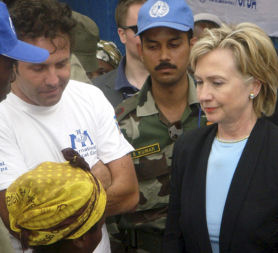Hillary Clinton condemns Congo rapes
 Lindsey Hilsum
International Editor
Lindsey Hilsum
International Editor
The mass rape of women in the Democratic Republic of Congo appears to be systematic, rather than opportunistic, writes International Editor Lindsey Hilsum.

The US Secretary of State Hillary Clinton is the latest person to condemn the mass rape near Walikale in the Congo.
“This horrific attack is yet another example of how sexual violence undermines efforts to achieve and maintain stability in areas torn by conflict but striving for peace,” she said.
Last August Mrs Clinton visited Heal Africa, one of the aid agencies which helps rape victims in the DRC, and which is counselling and treating the women affected by this latest horror.
Two senior UN officials are en route to the DRC to investigate how the assaults occurred so near a UN peacekeeping base, and the UN Secretary General Ban Ki-moon has expressed his outrage.
The outcry makes me wonder why we (whoever ‘we’ is) have failed to stop the epidemic of rape which has infected Central Africa for the past 15 years.
At a lunch organised by an aid agency I attended a few months back, a well-known pop star talked about the issue. She was horrified, as well she might be, and determined that “something should be done”. I felt a wave of impotence.
This is not an “untold story”. One of many documentaries on the subject won a Sundance Prize in 2008. Channel 4’s Dispatches and Unreported World have told the story several times, as have we at Channel 4 News.
The popular NBC series Law and Order has featured the issue, and Ted Koppel, one of the most influential US anchormen, has reported first hand from Shabunda, one of the worst-affected areas.
It’s a fashionable cause, and aid agencies pay more attention to it than to other problems in the DRC. And yet, it never seems to get any better. This most recent incident appears to be systematic rather than opportunistic. Clearly it’s a failure of peace-keeping, and of politics, the men who govern the DRC do not see stopping rape as a priority.
But how can “we” stop it? Journalists have reported it, activists have campaigned, politicians have expressed outrage, but what realistically, can be done now to make a difference?